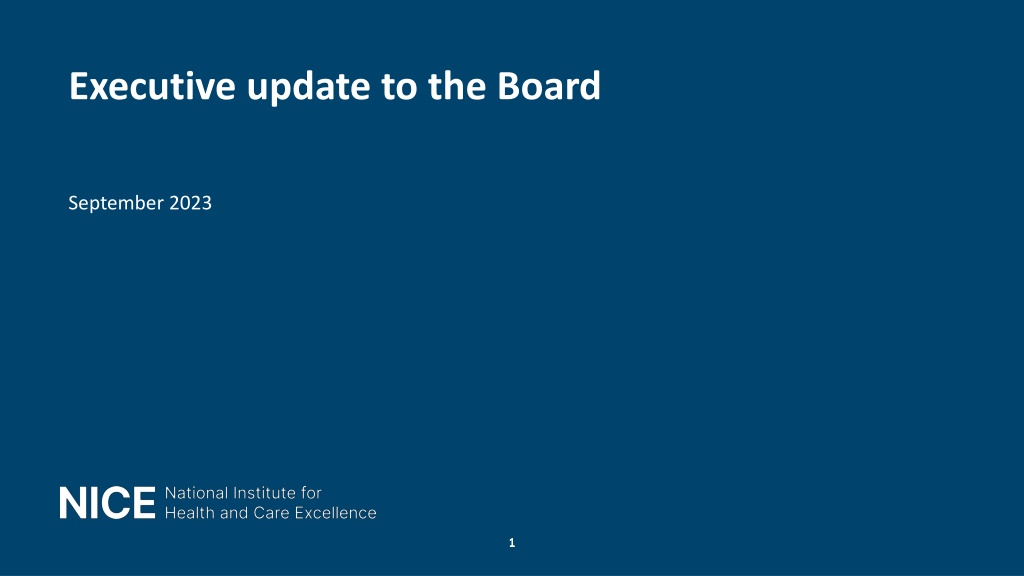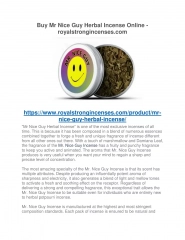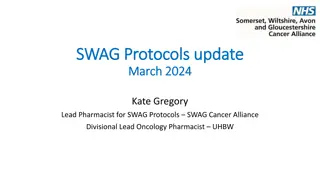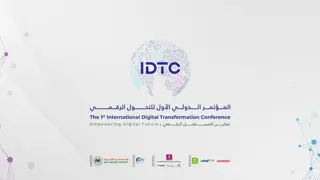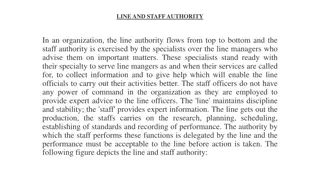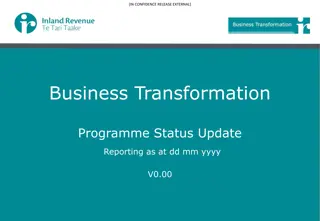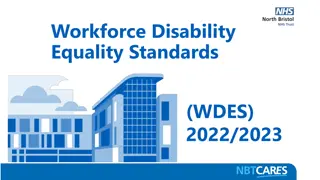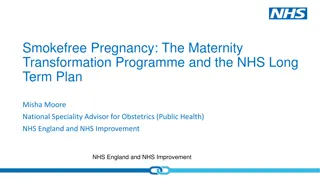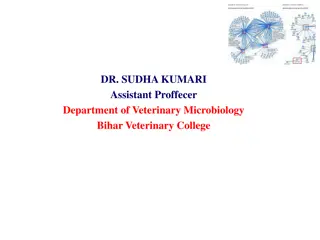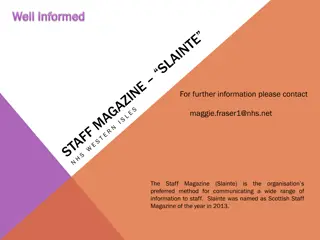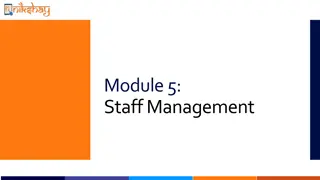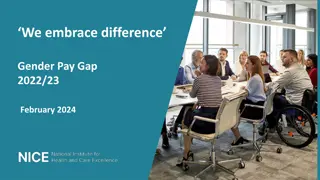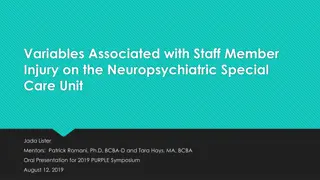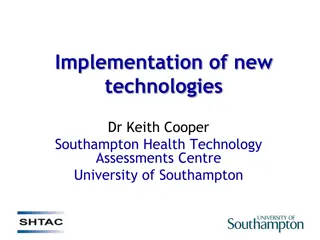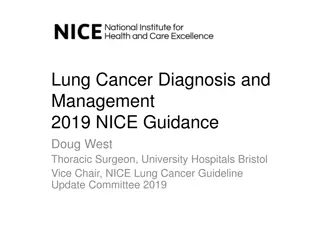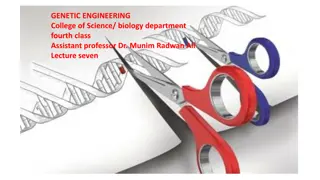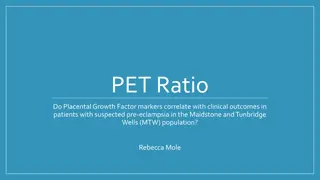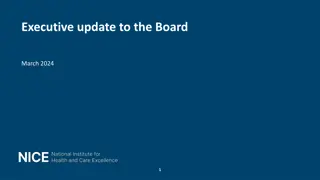NICE Transformation Update & Staff Engagement
NICE has made significant progress in its transformation journey, focusing on enhancing patient access to services, delivering up-to-date clinical information, and involving staff in the change process. The organization is responsive to staff feedback, implementing actions to improve communication, wellbeing, and workload management. Through a combination of strategic planning and staff involvement, NICE is driving organizational change to better serve its mission.
Download Presentation

Please find below an Image/Link to download the presentation.
The content on the website is provided AS IS for your information and personal use only. It may not be sold, licensed, or shared on other websites without obtaining consent from the author.If you encounter any issues during the download, it is possible that the publisher has removed the file from their server.
You are allowed to download the files provided on this website for personal or commercial use, subject to the condition that they are used lawfully. All files are the property of their respective owners.
The content on the website is provided AS IS for your information and personal use only. It may not be sold, licensed, or shared on other websites without obtaining consent from the author.
E N D
Presentation Transcript
Executive update to the Board September 2023 1 1 1 1 1 1 1 1
Executive Summary Since the last Board meeting, NICE has updated our website to share more information about our transformation to deliver more relevant, timely and useable guidance. We are delighted that feedback from our partners on our plans and progress has been so positive. More detail will be presented about this transformation at the NICE Conference 2023, which showcases NICE s commitment to helping practitioners and commissioners get the best care to people, fast, while ensuring value for the taxpayer. The conference will be held on 7thNovember in Manchester, and there is still time to register your attendance. We are also engaging internally and responding to staff feedback (slides 3-4) We continue to make progress in delivering our transformation, with recent highlights included in this report: 1. Focussing on what matters most by helping increase patient access to services and reduce NHS pressures ahead of winter in new draft guidance and a draft guideline about the use of virtual wards for Acute Respiratory Infections, and recommending four digital programmes for weight management services (slides 5-6) 2. Creating useful and useable advice through prioritising the most up to date clinical and safety information for medicines and retiring the print editions of the British National Formulary (BNF) and British National Formulary for Children (BNFC), and continuing to monitor and report implementation of our new methods for medicines evaluation which are providing greater flexibilities in committee decision making (slides 7-8) 2 2 2 2 2 2 2 2
Staff attitudes to transformation Around 150 staff attended 3 sessions in which they heard more about the 5-year Transformation plan, our progress and successes so far, and were asked provide their feedback and thoughts about the plan. Results from Mentimeter poll Themes from open discussion Positive areas: How are you feeling about our transformation? Staff appreciated the clear, transparent communication around the transformation. The work to break down siloes, and link cross organisational work received positive comments. Areas for improvement: Staff asked about NICE s mixed history of change, and why we believed it would work this time What does it mean for me? Most people understood the high-level transformation plan, but many were not able to make clear links with their area Well-being Some staff were worried about the stress and workload involved with changing. Many staff weren t involved in or aware of the business planning for their team, and therefore couldn t clearly identify and prioritise the key work to deliver when under pressure 3 3 3 3 3 3 3 3
We are responding to staff feedback with immediate and longer term actions Directorate delivery plans shared across organisation, including via horizontal networks (Senior Leaders and Immediate Change Champions) to clearly set out the priority deliverables for 23/24 with staff encouraged not to take on further, unplanned work Celebration of work delivered by teams at the sub-directorate level (10-15 people) across the organisation through all staff Medium term to showcase how all teams across the are contributing to the change across the organisation in our 4 priority areas Focus on wellbeing through all staff comms in November to share existing resources, and building in regular discussion points throughout year Longer term Revisit the business planning process at NICE to enable a bottom-up approach, with strategic alignment to ensure directorate plans are co-created and co-owned by those delivering them 4 4 4 4 4 4 4 4
1. Focussing on what matters most Preparing for winter pressures with new products to expand the use of virtual wards for respiratory infections A significant proportion urgent care from GPs or in hospital is supporting people with Acute Respiratory Infections (ARIs). This is particularly a challenge for the NHS in winter. NICE is now consulting on two new products to help with this challenge: draft guidance recommending the use of virtual ward technologies to monitor ARI patients a draft guideline on the assessment and management of ARIs including the use of virtual wards. These two products will help improve the assessment and management of ARIs to reduce hospital admissions and speed up discharge by enabling people to be remotely monitored at home, thereby freeing up hospital beds. NICE has also recommended that further research is conducted on people s views and experiences of remote consultation, and that further evidence is gathered to establish the cost savings from virtual wards. 5 5 5 5
1. Focussing on what matters most Increasing patient access to weight management services through new digital programmes More than a quarter of adults in England are living with obesity and are at risk of a range of longer-term health complications. Some people are living in areas where there is no specialist weight loss service and a long waiting list. In new draft guidance, NICE has recommended four digital programmes to increase access to weight loss services and help cut NHS waiting times. The platforms include support from a multidisciplinary team of healthcare professionals, while some of the digital programmes include the ability to prescribe weight management medication such as semaglutide or liraglutide to eligible people as part of their package of care. Up to 48,000 people will be able to access the virtual services, potentially saving up to 145,000 hours of clinician time. Over the next four-years, evidence will be generated on their long-term cost effectiveness. 6 6 6 6
2. Creating useful and useable advice Providing the most up to date clinical and safety information for medicines by prioritising the online and mobile British National Formularies Following extensive user research showing an increasing preference for the online and mobile app versions, the upcoming editions of BNF and BNFC (scheduled for distribution in October and November 2023) will be the last print editions to be supplied to the NHS in England by NICE. Prioritising the use of digital versions of the BNF and BNFC over the print version represents the most efficient and safe way of accessing this trusted source of medicines information and provides benefits to clinical safety and environmental impact, as well as supporting the NHS Long Term Plan objectives of digital transformation. Print versions of the BNF and BNFC are provided once a year and are out of date by the time they are received by healthcare providers. Digital versions of the BNF and BNFC can be accessed via the NICE website (no login required), the BNF App, or the Medicines Complete website. 7 7 7 7
2. Creating useful and useable advice Monitoring implementation of new methods We are continuing to track key data regarding implementation of new and changed methods components which ensure our recommendations reflect what society values most, take account of all available evidence, and enable patients to access promising treatments while evidence is being generated We will regularly report this data to the Board. Figures in brackets represent the changes since the last data collection period, up to March 2023. Up to June 2023, there are 43 (+9) topics using the new manual for technology evaluation, of which 28 (+17) are final published guidance (21 [+10] of which are positive) 8 (+2) have seen companies apply for a severity modifier, 5 (+2) of which have been accepted by committee, using all levels of available modifier (up to 1.7) Real world evidence has been used in 19 (+4) company submissions. In 8 (+2) of these cases, the committee accepted the RWE as primary evidence Additional flexibilities have been granted in 8 (+3) topics, leading to increased acceptable incremental cost effectiveness ratio (ICER) thresholds based on difficulties with evidence generation, impact on health inequalities, uncaptured benefits, and unmet need. 8 8 8 8
